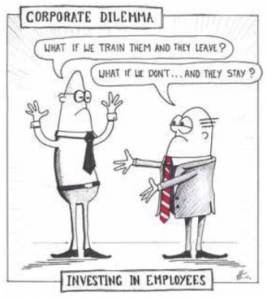Everyone knows the parable about the CEO and the CFO… the one that goes
 It resonates because we know it to be intuitively true. Even if we’re investing in bringing on the BEST people, we know we have to invest in them. We also all agree on a few other things as well:
It resonates because we know it to be intuitively true. Even if we’re investing in bringing on the BEST people, we know we have to invest in them. We also all agree on a few other things as well:
- We want smart, educated, capable people to start
- No one comes “trained” out of school or from another company
- Someone who doesn’t know what they’re doing is ineffective
When, then, is it so hard to invest the time and resources into a well defined, scalable, and repeatable training process? An enormous missed opportunity is to do this early in the life of your business because “we don’t have that many new hires” (read rookies, more on that later). A training process does not have to mean hiring a full time trainer, what it DOES mean is an intentional process for training employees through their life at your business. This is one of those perfect “well I don’t have time for it” being exactly what you need to make time for to enable yourself to have more time in the future. From new hire training, to on going skills training, to developmental training - the only way to ensure that you have great people is to make them great.
New Hire Training
One mistake we see over and over from companies is trying to solve the “kids out of school don’t know anything” problem by looking just at experienced hires. “I want someone who can hit the ground running”.
New hire training is not the “rookie” training. Someone coming into your business with industry expertise still needs training - on your business. You spent a lot of time in recruitment getting to know this individual, and communicating about all the things your company can do to enable her/him for success. Now is the time to double down on enabling a new hire for success - rookie or experienced hire.
Of course, you don’t want to put an experienced hire through the same paces as a rookie, but training is about both skills and alignment. Focusing on core areas of your business (Culture, Process, Technology, Organization), training for all new hires target these areas with the same principals. You want a new hire to come away and understand YOUR culture, YOUR processes, and how to operate YOUR technology and navigate YOUR organizational structure - which is new to every new hire. To put it another way - no one is capable of hitting the ground running at a new company.
Two huge things you can do today to make a difference in new hire training:
- Put together a structured calendar of training events, and be specific. Whether you have a dedicated training resource, or it is a team effort, you need to adhere to a schedule and assign responsibilities so people can plan for what’s ahead. As an example - on day 1, a new hire should fill out new hire paperwork with HR Manager from 09a-09:45am then get an overview of history and values from a C-Suite / President. . She/he should have lunch with her/his direct manager. Carrying forward - on day 67, a rookie new hire should y-cord with her/his manager, where the rookie is making the calls, and the manager is able to provide pointed feedback and assess progress
- Think about training as education - which means it’s like school. In school there was a lecture, textbooks, homework, projects, progress tests, and a final exam. Right now, we have lecture(-ish), and a final exam. That is hardly setting up anyone for success. Develop training materials. Have “quizzes”, and interactive “projects” (ex. - draft a sales email, or do some load entry from this mock email where you control the inputs and what’s missing). This takes time, I get it, but ad-hoc materials and instruction are holding back your new hires and costing you money.
Ongoing Training
Training - it’s not just for new hires anymore!
If you are not doing ongoing training, it is an enormous missed opportunity to get the most out of your people. No matter how robust your new hire training is, or how much industry experience an individual has, or how innately (s)he “gets” your culture/technology/goals, no employee is “set it and forget it” with a complete and fully refined skill set. That is to say nothing of the fact that things are always changing, both in your organization and in our industry.
Not just is ongoing training is essential to the continued growth of your organization, but you are setting your employees up for failure without it. That is not to say they won’t have some success, but for your people to reach the pinnacle of their capabilities, ongoing training is a “can’t miss.” Just like your experienced hires need training as a new hire, providing training to employees on an ongoing basis is something best-in-class organizations are doing as a way to stay close an employee throughout her/his time with the company.
It is also an incredibly important time for the company and the individual to be able to communicate. You want your seat-level employees to be “heads down” getting the job done, but you are often operating at another level and learning things they need to know. One example - when was the last time you made a slight change in your technology (like a TMS versioning or feature release), and just let your employees figure it out? Another great example is around negotiation and relationship management. You can communicate that the market is softer, or that capacity is tightening, through an email blast. However, many employees can intuitively and optimally manage their Customers/Carriers balancing negotiation with relationship preservation. Jacking up a customer’s rates, or cutting a carrier’s, is going to have disastrous relationship consequences for your brand so some employees avoid it all together. I saw this first hand Q4’15/Q1’16 as the market moved aggressively in the broker’s favor. On going training on pointed negotiation strategies with our carrier and customer teams helped maintain our relationships, and grow our margins.
Speaking of communication - One subtle benefit is that it allows leaders in the organization to have close touches with an employee in a structured way, learning more about how the employee truly is as a “team player”, her/his strengths, weaknesses, and goals. Ongoing training also allows those doing the training to provide feedback in a more positive communication environment as compared to a yearly “review”.
Developmental Training
Investing in your people means more than training them on their core job functions, it means setting them up for long term success in their careers, with you or elsewhere. Investing in development helps make it more likely it’s with you…..
Employees constantly talk about growth, and companies normally interpret growth as “more money and a career path”. Growth to a seat level employee means the same thing as growth to you -- skills development and growth. Your best employees want to learn about things that will help them be better not just at their job, but also in the future. One impactful and simple training our clients do is training on Excel.
Often, developmental training can benefit the individual and the company. The best example of this - How many first time managers are thrust into that role, without any formal training or guidance? Skills like conflict resolution, having difficult conversations and emotional intelligence, and leadership tactics, are a must haves in the tool bag for any managers. However, individuals come with varying degrees of natural savvv and, as first time managers, are often just told to “figure it out and hit KPIs”. Providing training on “management skills and tactics” to all employees helps seat level employees see “growth”, even if they’re not promoted. When one is promoted, (s)he has a head start while the others have a better understanding of how “heavy is the head that wears the crown”.
A company that invests in training is making a real commitment to the company culture. Training is the flywheel that drives the best organizations.




